Foreign Language at Keio University (2)
Russian Festival at Hiyoshi Campus
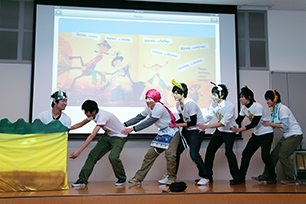
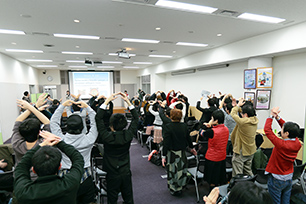
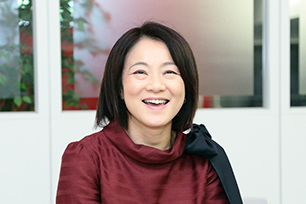
Assistant Professor in the Faculty of Law
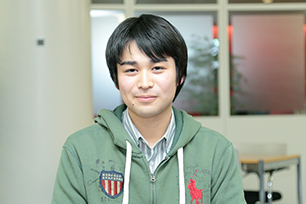
third-year student of the Department of Law in the Faculty of Law
The third annual Russian Festival was organized by the Keio Research Center for Foreign Language Education and held in the Symposium Space of the Raiosha at Hiyoshi Campus on December 15, 2012. Assistant Professor Yoko Kumanoya of the Faculty of Law says, "The more opportunities you have to use and speak a language, the more you learn it, but unfortunately there aren't many opportunities to use languages other than English unless you study abroad or travel. Here at Russian Festival, we aim to create an environment where present and former students of Russian and faculty members can interact at will and use the Russian language openly and expressively in forms such as song and theater."
In this year's festival, students of Russian from the Faculty of Letters and the Faculty of Science and Technology joined students of the Faculty of Law, fostering interaction across disciplines for the first time. Moreover, students with study abroad experience, alumni, and many others from inside and outside the university flocked to the festival for an impressive outcome of approximately 90 participants.
Second-year students enrolled in the Russian intensive course in the Faculty of Law ran the event. One of these students, Masanobu Nakajima, says, "Compared to languages like German, French, and Chinese, students of Russian may not be large in number, but we were able to inspire a sense of camaraderie across age and discipline by holding a Russian quiz and singing Katyusha together."
Nakajima's motivation behind studying Russian lies in his desire to see figure skating at the Sochi 2014 Winter Olympics. For now, he watches live broadcasts of competitions on Russian-language websites and follows figure skater Evgeni Plushenko's Twitter.
"It was tough learning Russian grammar, but I was drawn to the language's many voiced sounds and the feel of the language. I would like to join a trading company and get involved in the natural gas business in the future, so I think language ability will prove beneficial when looking for a job."
Assistant Professor Kumanoya says she began learning Russian because she wanted to see the shift in Soviet Union society after the perestroika reforms. "That first motivation can be anything: politics, literature, folklore, music, sports, or practically anything else. Russia is a country with a unique appeal that differs from the West. I would like others to study Russian and realize this for themselves," she says.
Learning English for Nursing Care
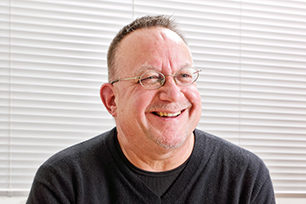
Associate Professor, Faculty of Nursing and Medical Care
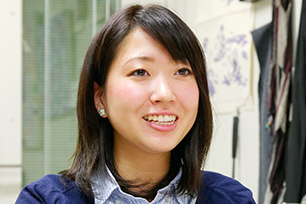
Second-year Student, Faculty of Nursing and Medical Care
"English ability is important not only for those hoping to work or study abroad after graduation, but also for those working in Japanese hospitals, where the number of foreign patients continues to increase," says Dr. Thomas Hardy, Associate Professor of the Faculty of Nursing and Medical Care and instructor of English for Nursing Care I & II. He says that it is important to acquire "healing" English expressions for more effective communication with patients.
"An illness or injury can make anyone anxious. This anxiety only grows when facing such a situation in a foreign country. In order to give foreign patients reassurance, it is important for nurses to encourage patients while being aware of differences in custom and culture. In the United States, where differences in patients' needs are widely acknowledged, nurses must skillfully elicit patients' complaints and concerns by frequently engaging them in conversation. I hope that students can learn conversation techniques to soothe and relieve patients' anxiety."
Namiko Kakegawa, who is currently enrolled in the course, says that students learn authentic English expressions that often differ completely from their Japanese equivalents.
"Classes are small with only five students each," she says. "During class, sometimes we perform short skits in which each student takes on the role of patient, doctor, or nurse. There are patients of all kinds, some full of anxiety and others who are extremely stubborn. The basic concept is to listen attentively, but we think for ourselves about what expressions would be appropriate to alleviate a patient's worries or to share information with doctors and colleagues, and conduct our conversations in English. The key to communication is to be aware of your facial expressions and tone of voice and occasionally adding in a joke or two."
*Position titles, etc., are those at the time of publishing.
